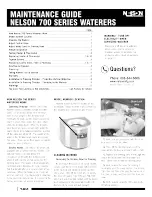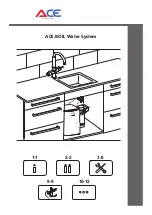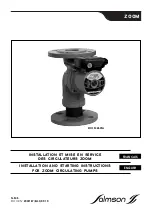
8
DO NOT
use extension cables.
9
Always disconnect from the mains supply before attempting any maintenance etc.
9
When not in use switch off pump and remove plug from power supply. Rinse pump, drain out any water an
d store in a frost free, safe
location.
WARNING! DO NOT
allow uncontrolled discharge of contaminated water which would pollute the environment.
2. INTRODUCTION
Manufactured from heavy duty corrosion resistant materials with stainless steel motor case and polypropylene base cover. Capable of operating
in dense and dirty water with a maximum particle size of 40mm. High flow rate up to 25000ltr/hr (416ltr/min). Fitted with an automatic cut out,
which can be set at multiple heights using an innovative cable fixed mounting bracket. Minimum water depth of 53mm. Suitable for the effective
drainage of cellars, sinks, sisterns, baths and the general transfer of water and dense liquids.
PECIFICATION
Model no: ................................................................WPD415
Cut-out: .................................................................. Automatic
Outlet OD: .................................................................... 51mm
M
aximum output/min:
........................................
417ltr/(92gal)
M
aximum output/hr:
..................................
25000ltr/(5500gal)
Maximum head: ............................................................. 11mtr
Maximum water depth: ....................................................7mtr
Minimum water depth: .................................................. 53mm
Maximum particle size: ................................................. 40mm
Motor power: ...............................................................
1300W
Supply: ...........................................................................230V
3. OPERATION
3.1.
INSTALLATION AND COMMISSIONING
3.1.1.
Attach a sufficiently long and strong rope to the handle
before first use. The pump is submerged into the liquid
on this holding rope and can also be carried with it as
well as the handle.
NOTE: DO NOT
suspend unit from power cable.
NOTE:
With continuous use of the pump, the condition
of the rope must be regularly checked as it can decay
and break over time.
3.1.2.
Connect pressure pipe
3.1.2.1. For occasional use, use a suitable water hose.
3.1.2.2. The use of rigid pipes with a non return valve is
recommended for use at a fixed location. This prevents
return flow of liquid when switching off.
3.1.2.3. Screw the pressure line onto the pressure connection.
3.1.2.4. All threaded connections must be sealed with thread
sealing tape.
3.1.2.5.
When using a hose, screw a suitable hose adaptor onto
the pressure connection. Push the hose firmly onto the
hose adaptor and secure with a hose clamp.
3.1.3.
Installation
3.1.3.1.
The pump needs an area of at least 50 x 50cm (the float switch must be able to move freely so that it functions properly.
3.1.3.2. The pump can be submerged under water to the submerged operating depth of 7metres.
3.1.3.3.
Install the pump so that the suction openings cannot be blocked by foreign bodies (place the appliance on a firm, even base if
necessary.
3.1.3.4. Ensure that the pump is stable.
DO NOT
lift the pump with the cable or the pressure hose as these are not designed for the tensile stress from the weight of the pump.
3.1.3.5. Submerge the pump at an angle into the liquid to be delivered, so that no air pocket forms on the underside of the appliance. Suction
would be prevented by this. Once the pump is submerged, it can be righted again.
3.1.3.6.
Leave the pump at the bottom of the liquid container. Use a strong rope attached to the carrying handle of the pump for lowering.
3.1.3.7.
Tighten the end of the rope firmly after lowering.
3.1.3.8. The pump can also be operated whilst suspended on a rope.
NOTE:
For operation whilst suspended on the rope,
DO NOT
operate without the pressure hose. Avoid the pump twisting round its
longitudional axis.
3.2.
OPERATION
3.2.3.1. Connect the pump to mains supply.
WARNING!
The float switch must be able to move so that the submersible pump cannot run dry. Doing so would cause damage to the
unit.
MAINTENANCE
3.3.
Before every use:
• check casing and cables for damage
• check float switch for damage - lift and shake the switch to check the free movement of the contained metal balls
3.4.
After every use:
• clean the appliance: rinse with clean water, remove stubborn contamination with a brush and detergent. Submerge the pump in a
container with clean water and switch on for a short time to rinse the inside of the pump. Clean the suction area, see below.
3.5.
Cleaning the suction area
3.5.1.
Clean all accessible parts of the inside of the casing. Remove fibres which have wound round the rotor shaft by opening the
pressure connection. Remove stubborn contamination with a brush and detergent.
NOTE:
Before using the pump again, first ‘soak’ it so that any possible dirt residues do not block the pump.
WPD415| Issue 1 15/12/15
Original Language Version
© Jack Sealey Limited





















